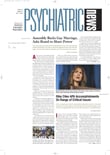Thank you for the article in the April 5 issue on the successful fight against the juvenile death penalty in the Supreme Court case Donald Roper v. Christopher Simmons (“Court Bars Death Penalty for Youth Under Age 18”). The article noted how APA and the American Academy of Child and Adolescent Psychiatry (AACAP) signed onto a brief in the case submitted to the Supreme Court. I would like to point out the actions of a prime and early mover on the issue, the American Society for Adolescent Psychiatry (ASAP).
In 1986 ASAP initiated and sponsored the original psychiatric argument in its amicus curiae brief in the case Thompson v. Oklahoma. At the time, ASAP was the only organization to sign on to an amicus brief concerning adolescent development. That brief was repeatedly referenced in the Supreme Court's decision in 1988 to strike down the death penalty for capital crimes committed by children and adolescents below the age of 16.
I was also active within APA on this issue, and I was instrumental in bringing the issue to the Council on Children, Adolescents, and Their Families. In 2001 the council referred AACAP's position statement opposing the juvenile death penalty to APA's Joint Reference Committee (JRC) for possible adoption by APA. The JRC referred the statement to the Council on Psychiatry and Law, which revised it. The statement was subsequently approved by the Assembly in May 2001 and by the Board of Trustees a month later.
In that same timeframe, ASAP joined with the Juvenile Death Penalty Initiative of the American Bar Association and one of its able leaders, attorney Stephen Harper. We wrote letters under the auspices of our respective organizations to the governors of Texas, Oklahoma, Missouri, and Kentucky asking them to commute the death sentences of adolescent offenders. We had some success and helped to slow and even to prevent some executions. Subsequently I testified on adolescent brain development before the South Dakota legislature. In March 2004, Gov. Michael Rounds signed a law raising the age of eligibility for the death penalty to 18.
Finally, in 2003 ASAP initiated another amicus brief, and APA's Board of Trustees voted to sign on in June 2004. Dr. Robert Weinstock, the current president of ASAP and a member of APA's Committee on Judicial Action, played a key role in revising the language to improve it.
A summary of the brief's arguments states, “The adolescent's mind works differently from ours.... Scientists have documented the differences along several dimensions. Adolescents as a group, even at the age of 16 or 17, are more impulsive than adults. They underestimate risks and overvalue short-term benefits. They are more susceptible to stress, more emotionally volatile, and less capable of controlling their emotions than adults.
“In short, the average adolescent cannot be expected to act with the same control or foresight as a mature adult.”
This brief is now history, and we in ASAP feel a strong sense of pride as part of the large coalition of professional and advocacy groups that worked together to end the execution of juvenile offenders in the United States.
